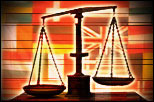Why IT sucks at being a law hound

When legal wrangling turns serious and lawyers send corporate IT departments a barrage of emails looking for information to use as evidence in an upcoming trial, the IT geeks often aren't up to the challenge.

"It seems like a simple exercise. Go to IT. They'll get the information and pass it on. It's actually much more complex than that," Maureen Duffy, national practice coordinator for legal firm Freehills, said at the Information Management and E-Discovery Summit yesterday in Sydney.
Just as few lawyers are technical gurus, very few IT employees have legal qualifications, making it difficult for them when it comes to recognising what's important. "Corporate IT is not really trained in what is legal evidence," Duffy said.
Additionally, most IT departments have infrastructure expertise, not the specific know-how required to find information on the corporate network.
One example of where evidence gathering went horribly wrong, according to Duffy, is a recent US patent dispute between mobile chipmakers Qualcomm and Broadcomm. Qualcomm failed to produce 46,000 emails related to the case when requested to deliver communications between it and a standards body, although it had managed to find 1.2 million other documents. The later discovery of the archived emails cost Qualcomm US$8.5 million and had six of its lawyers referred to the state bar of California.
It could have been intentional withholding of evidence, Duffy said, but it could equally just have been a failure in the process of finding electronic evidence.
The IT department may not have even thought about looking in archives, according to Duffy. "IT generally tend to think of active data," she said.
Another problem for the IT department is the searches themselves, an area where unknowing techies and unskilled lawyers can fall down. "The use of word searches is very risky," she said, with people's language rarely being consistent over time. Duffy recalled a case where she had been given 125GB of useless information following a search, and not one document from the file of the relevant project.
The method of corporate filing is also not always kosher and, according to Duffy, it's imperative to understand how files are organised. "Do you keep all your important documents in the rain file, because you started them on a rainy day?" she asked, adding it's this type of irregularity she encounters in her work.
Discovering necessary evidence will increasingly move into the realm of artificial intelligence. "The more your software can target you to the key information, the less the review will cost," she said, but until then, lawyers must delve into the muck themselves, potentially using an in-house technical team.
However the law firms tackle it, they need a checklist or standards to find diamonds in the dross according to Duffy, adding that if something goes wrong, they and not IT will have to justify their actions before the court.